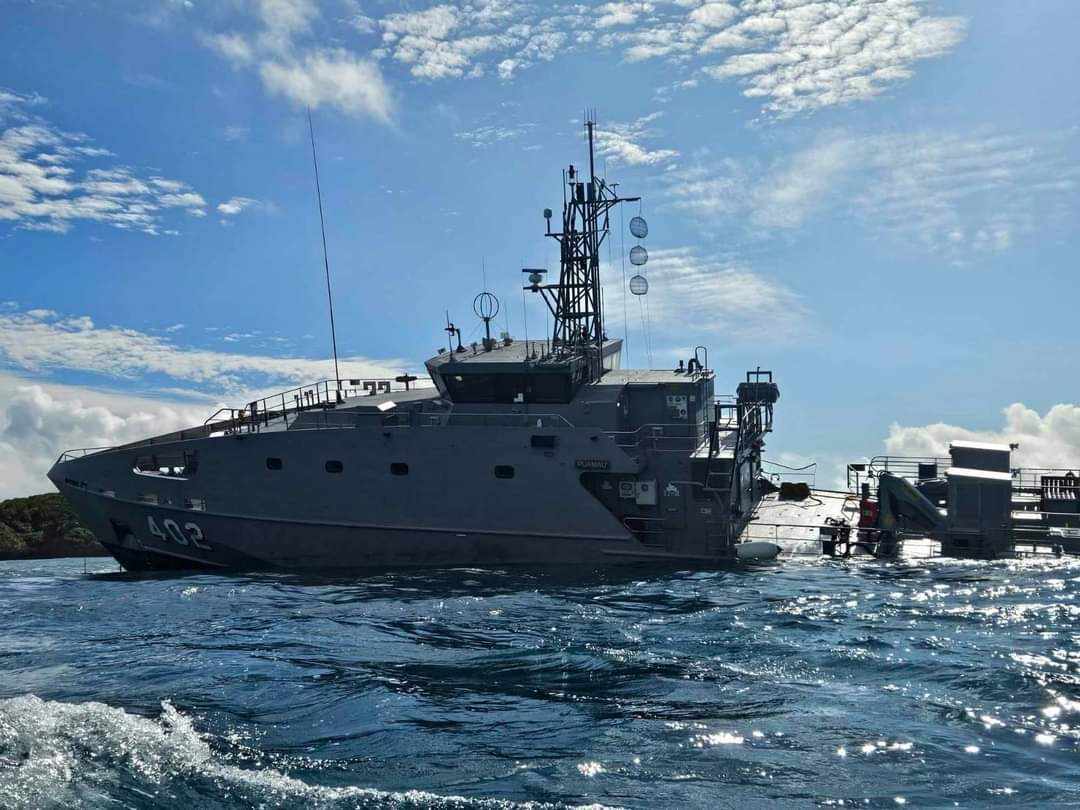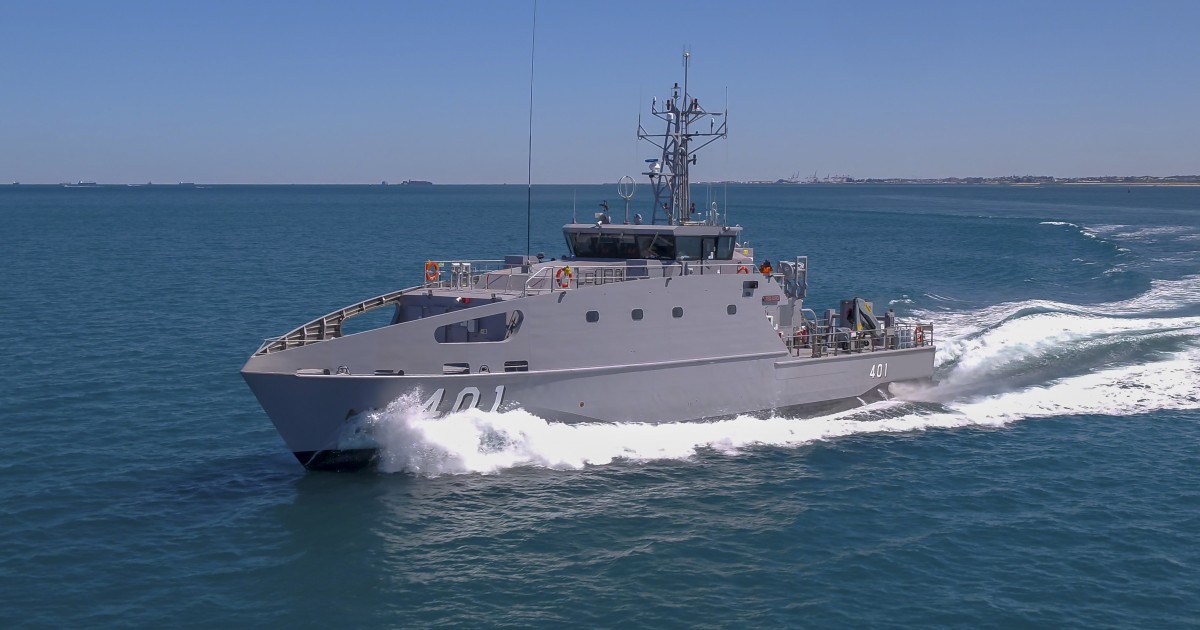Fiji is grappling with a major embarrassment after the nation’s newly commissioned patrol boat, a gift from Australia, ran aground during its maiden deployment last week. With Australia’s help, the Fijian Navy has undertaken a mission to salvage the vessel while striving to minimize any environmental impacts, including the risk of an oil spill.
The Republic of Fiji Naval Ship (RFNS) Puamau struck a reef in the remote Lau group of islands, an area known for its treacherous sea passages, midway through its inaugural two-week mission. The grounding occurred in the southeastern reaches of Fiji, a particularly challenging area for navigation.
The patrol boat was handed over to Fiji’s Prime Minister Sitiveni Rabuka at a ceremony in Perth in March and commissioned less than a month ago. The incident marks a troubling start to its service, undermining Australia’s gesture of goodwill.
Fortunately, there have been no reports of injuries resulting from the incident. The crew of the RFNS Puamau was safely transported to Suva by another patrol boat, the Austal-built RFNS Savenaca.
Efforts to salvage the stricken vessel are already underway. The Fiji Navy has deployed an additional patrol boat to assist in the recovery, while work to pump water out of the engine room is ongoing to prevent flooding.

Australia has also stepped in to aid the recovery operation. It dispatched specialized recovery equipment to facilitate the boat’s extraction from the reef, and a second vessel was designated to transport the gear to the location.
The Fiji Navy announced on June 15 that favorable weather conditions would aid in the recovery of RFNS Puamau. In an official statement, the Fijian Navy expressed its commitment to minimize environmental impact during the recovery process.
“The Republic of Fiji Navy reaffirms its commitment to minimizing environmental impact during the de-fuelling process now underway,” it said. “Measures to mitigate a potential oil spill have been deployed, and navy divers and engineers on scene continue to monitor the situation.”
The complete extent of the damage to the RFNS Puamau is uncertain, but the recovery process could take several days.
The incident has cast a shadow over what was meant to be a key enhancement to Fiji’s maritime capabilities, highlighting the challenges of operating in the Pacific’s complex and often hazardous waters.
“Defective” Australian-Built Patrol Boats
Australia has delivered 19 Guardian Class patrol vessels to Pacific nations as part of the Pacific Patrol Boat Replacement Project. Australia is gifting these vessels to Papua New Guinea, Fiji, the Federated States of Micronesia, Tonga, Solomon Islands, Cook Islands, Kiribati, Marshall Islands, Palau, Samoa, Tuvalu, Vanuatu, and Timor-Leste.
Austal Australia designed, built, and maintained these steel monohull patrol boats, which are approximately 130 feet (39.5 meters) long.

They are noted for their superior speed compared to previous Pacific-class patrol boats. They also possess enhanced seakeeping capabilities, improved amenities, and increased mission versatility.
Equipped with an integrated Rigid Hull Inflatable Boat (RHIB) stern launch and recovery system, these boats are specifically tailored for border patrols, regional policing, search and rescue missions, and other domestic and international operations.
The Guardian-class patrol boats, however, have come under scrutiny due to a series of issues that have surfaced in recent years, prompting calls to halt their use.

One significant problem, discovered as early as February 2021, involves cracks in the coupling between the engine and the gearbox. Pacific island countries were informed of this issue at the time.
In May 2022, concerns were raised about the medical bay on the vessels, which reportedly use recirculated air instead of fresh air.
More alarmingly, a fault in the exhaust system was discovered later that month, resulting in carbon monoxide entering a compartment. Although the area is typically unoccupied by crew, the issue poses potential health risks.
Following international media coverage of these issues, West Australian-based shipbuilder Austal took responsibility and announced plans to cover the costs of fixing defects found in its Guardian-class patrol boats, including those related to the exhaust system.
Austal, along with defense representatives, traveled to the Pacific to inspect all vessels and guided mitigating risks until permanent solutions could be implemented.
While the Guardian-class patrol boats have encountered various challenges, some incidents have been attributed to operator error.
For instance, a boat provided to Samoa was deemed unsalvageable after running aground on a reef in 2021, and the officer in charge was subsequently found guilty of negligence by a police tribunal. In 2023, Australia delivered a replacement Guardian-class patrol boat to Samoa.
Other instances of damage include Tuvalu’s His Majesty’s Tuvaluan State Ship (HMTSS) Te Mataili and Vanuatu’s Republic of Vanuatu Ship (RVS) Takuare, both severely affected by cyclones in March 2023. Australia has since expedited the replacement process for Tuvalu’s vessel and is currently overseeing repairs for the RVS Takuare in Cairns.
Meanwhile, the vessels made by Austal have faced notable challenges over the years. The Armidale-class patrol boats experienced severe cracking issues due to extensive use in intercepting asylum seekers.
Similarly, the interim replacement — six evolved Cape-class vessels — faced delays after construction with substandard aluminum sourced from China.
In addition, Austal’s littoral combat ships, constructed in Alabama for the US Navy, have also faced challenges. These vessels have developed hull cracks, resulting in a strict speed limit of 15 knots being imposed to mitigate further damage.
These incidents underscore concerns about quality control and operational reliability across Austal’s various shipbuilding projects.
- Contact the author at ashishmichel(at)gmail.com
- Follow EurAsian Times on Google News





